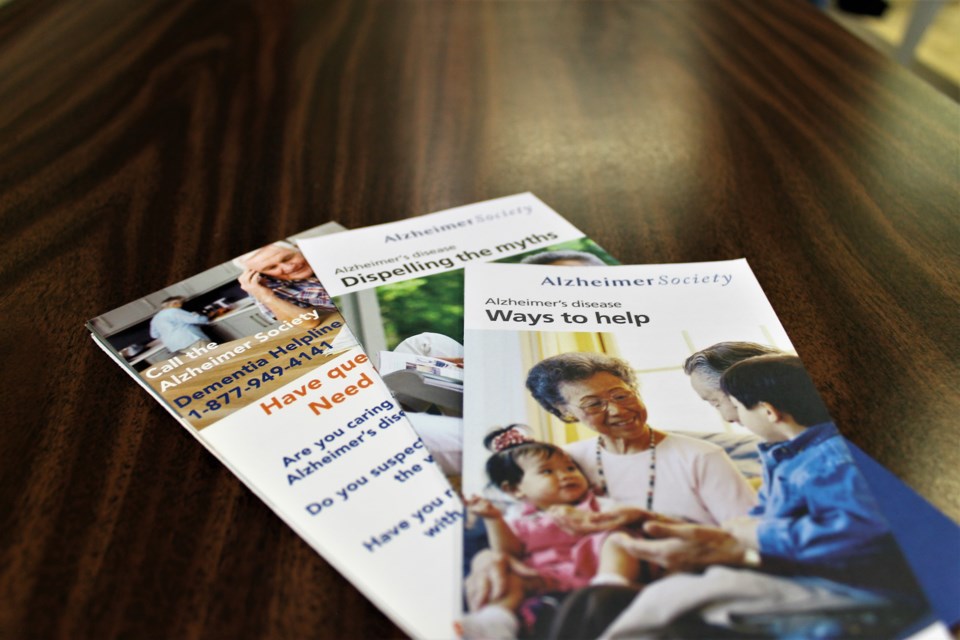January is Alzheimer’s Awareness Month across the country, and the Alzheimer Society of Saskatchewan has been campaigning diligently to create more understanding and reduce stigma around all forms of dementia.
The awareness campaign focuses on a number of important messages each year, highlighting the Alzheimer Society as a pertinent resource for anyone seeking more information about Alzheimer’s or dementia.
An estimated 19,185 individuals in Saskatchewan are currently diagnosed with a form of dementia, with a nation-wide total of approximately 564,000 people living with Alzheimer’s disease or a related dementia. Projected data estimates that within 25 years — or just one generation — that number will increase to 1.4 million people in Canada.
Nina Nyalowo, helpline coordinator at the Alzheimer’s Society of Saskatchewan, said one of the focuses of this year’s campaign has been to increase awareness about the warning signs of dementia.
Although the most commonly known sign of dementia is memory loss, Nyalowo said that there are actually 10 warning signs that people should look for to recognize the onset stages, all of which can be experienced differently and at different stages depending on the individual.
“There is more to dementia than just memory loss and Alzheimer’s disease,” said Nyalowo. “Not everyone has the awareness that some of those other symptoms are a result of dementia, so part of our awareness objective is to let people know that if you see some of those warning signs, to look into having an assessment done and look into getting extra supports in the community.”
Warning signs include symptoms like difficulty performing familiar tasks, disorientation, problems with language and abstract thinking, misplacing things, loss of initiative, impaired judgement and changes in mood, behaviour or personality.
Knowing the warning signs is important, continued Nyalowo, as it can help people seek help with an early diagnosis, to receive the supports they need — many of which are offered by the Alzheimer Society itself, which is another aspect of the organization's awareness goals.
The Alzheimer Society runs a number of support groups available to individuals with dementia, loved ones and caregivers, which Nyalowo noted were a great place to learn more about dementia from other people living with the disease.
Programs like the Minds in Motion program, which provides both socialization and exercise for participants, and the Dementia Helpline are both useful resources for anyone seeking support during their journey.
Nyalowo specifically highlighted the helpline as a useful resource for anyone with questions, as the Alzheimer Society is a good starting point for finding information, receiving support referrals and seeking a community going through the same experience.
“When you call [us], you get that connection to other people who are also going through the process, and that extra support from us. Sometimes we’re able to connect you to researchers to ask questions, or you can participate in research projects,” said Nyalowo. “It also enables us to follow up with people, offer services we think might be helpful like a learning series event or a presentation so they have the most recent information.”
Another large focus of the awareness campaign is to share the experience of dementia, to help reduce stigma and clear up misconceptions. The Alzheimer Society works to build a community for those affected by Alzheimer’s and dementia, to allow people to talk about how the disease affects their lives.
“The support we provide allows people to learn more about that hands-on experience of dementia, and we provide support to caregivers,” said Nyalowo. “The journey is as important as sharing information about diagnosis.”
Awareness is an important step in the long-term campaign to improve the experience of dementia, said Nyalowo. More awareness about dementia will hopefully lead to an improvement in access to diagnosis, promote more knowledge about recognizing early warning signs, and increase interest in research to better understand the disease.
To close out the month-long awareness campaign, the Alzheimer Society is hosting a free online event called “An Evening of Education Understanding Dementia” on Jan. 27 through Zoom.
Dr. Krista Lagimodiere from the Saskatchewan Health Authority and University of Saskatchewan will take the spotlight to talk about the different types of dementia, the risk factors and warning signs, and how to approach getting a diagnosis.
The event is open to the public, including those outside of Saskatchewan, and participants must register in advance by emailing [email protected] or online at the Alzheimer Society of Saskatchewan website.
For more information about dementia, Nyalowo encourages people to reach out to the Alzheimer’s Society with questions. The Dementia Helpline is available at 1 (877) 949-4141 or by email at [email protected].




